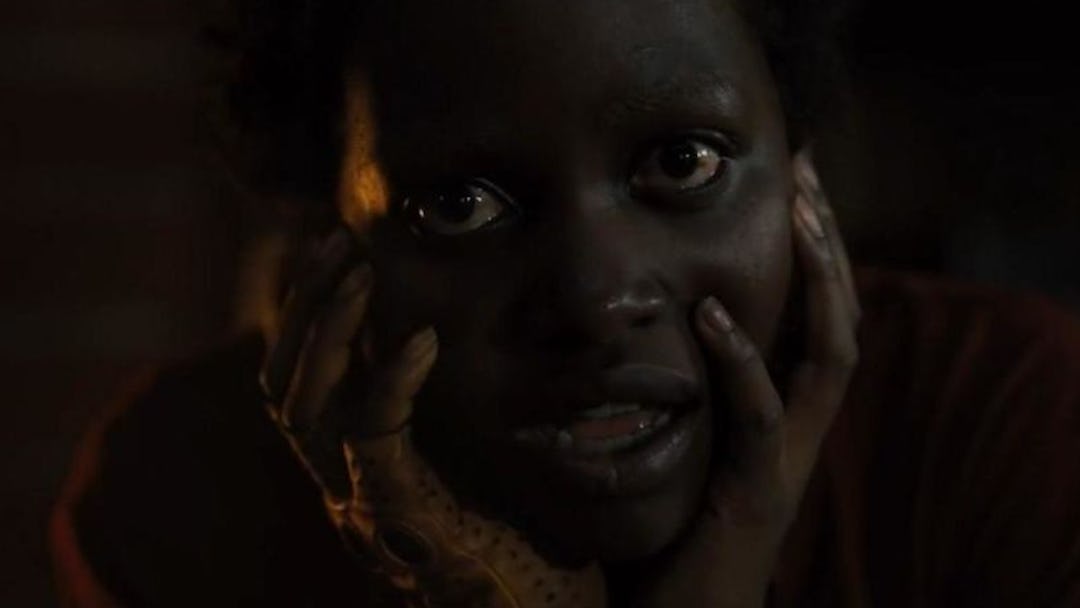AUSTIN, TX: “What if I just showed four episodes of This is Us in a row, no explanation?” Jordan Peele asked with a sly smile, during the introduction to Us, which is (most would agree) the most anticipated movie of this year’s SXSW Film Festival. Interest was so feverish in being among the first to see Peele’s sophomore directorial effort, the follow-up to his Oscar winner Get Out, that I heard people were lining up as early as five and a half hours before start time. This writer got in line two-plus early, and barely made it in. Expectations were sky-high. Peele had a lot to live up to.
The plot, put simply, goes something like this: an African-American family heads out to their summer house to relax. But the mother, Adelaide (Lupita Nyong’o) is reluctant to visit the nearby Santa Cruz beach; as a child, as seen in the film’s prologue, she wandered off from her family there, and what she discovered inside the right-off-the-boardwalk “Vision Quest” hall of mirrors (“find yourself,” dare its signs) left her deeply scarred.
Peele takes his time in these opening segments, paying particular attention to the clarity of the relationships; we know, fairly quickly, whom everyone is, how everyone feels about them, and how they fit in to this family unit. It is, unsurprisingly, a very funny movie — if anything, Peele pivots between horror and comedy even more gracefully than in Get Out. And this is personality-based humor, the best kind, with most of the laughs rooted in the squareness of bourgeois buppy tendencies of the family (especially Gabe, the dad, fleshed out handily by the very funny Winston Duke). And, this being a Jordan Peele picture, there’s a touch of code-switching; listen for the way Gabe’s voice changes when he tries to front like a tough guy after the home invaders show up.
And they do. If the opening scenes are deliberate, once Us gets going, it goes; the efficiency of the turn is striking, as is the confidence with which Peele sets his scenes, moves his camera, and freaks us out. In scene after scene he creates a mood of offhand, everyday spookiness, and then turns the screw with genuinely disturbing imagery. The visual strategies foreshadow the identity of the invaders, each of whom seems a bizarro replica of a member of the family; Peele is constantly framing his characters in mirrors, glass reflection, and even, late in the film, a thematically appropriate De Palma-style split diopter shot. The cinematographer is Mike Gioulakis (his credits also include Glass and It Follows), and he spends much of the film, which is set mostly over one long night, playing with light and dark and dark skin, in backgrounds and shadows.
(Jason Bailey / Flavorwire)
The editing is sharp — there’s a suite of cross-cut one-on-one confrontations, once each of our protagonists meets their doppelganger, that’s sort of staggering – but Peele is always careful to give his actors their moments. (Elisabeth Moss has one, carefully applying lipstick in a mirror, that is absolutely chilling.) Every performance lands, thought Nyong’o has the movie star role, and plays it as such; her payoff moments deliver, but she’s unnervingly creepy when playing her character’s villainous half.
And yet, with all those virtues noted, Us can’t quite match Peele’s debut. Part of that is just a question of timing; Get Out is a terrific thriller that also arrived at precisely the right moment, in the morning-after hangover of a stupefying presidential election, and seemed a timely reminder of the evil that our smiling friends and neighbors are capable of.
But if Get Out was accidental Trump commentary, Us is decidedly deliberate, particularly in its third-act explanations and revelations, and when Peele preceded the SXSW screening by announcing, “the movie is about a lot of things,” he tipped his hand a bit — particularly in the opening stretches, there’s a fair amount of seemingly random setup and sheer oddity, bunnies under opening credits and vague on-screen text about underground tunnels and a lot of details about the 1986 Hands Across America project. Some of it pays off, but in a way that makes those elements feel like side scrawlings in a director’s notebook, plot points created to accommodate stuff he thought would be cool to throw into the movie, rather than growing organically from the material.
(Jason Bailey / Flavorwire)
Get Out was the latter, and as a result, it was tight as a drum. Us is not that, which isn’t entirely a criticism. Such ambition — a sophomore filmmaker grasping to make a big statement, and fumbling a bit in the process — is not only forgivable, but admirable. Ultimately, he’s hoping to provoke thought, self-examination, even anger.
“My favorite thing is the idea that people will leave ready to have a conversation with whoever they’re with,” Peele explained in the post-screening Q&A. “I have a very clear meaning and commentary I’m trying to strike with this film, but I also wanted to design a film that’s very personal for every individual.
“In the broader strokes of things, this movie is about this country. And when I decided to write this movie, I was stricken by the fact that we are in a time where we fear the other. Whether it is the mysterious invader that we think is gonna come kill us and take our jobs, or the faction that we don’t live near that voted a different way than us… we’re all about pointing the finger. And I wanted to suggest that maybe the monster we really need to look at has our face. Maybe the evil is us.”
“Us” is out March 22 in wide release.
